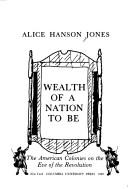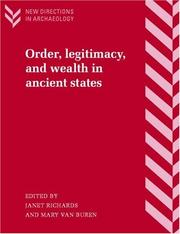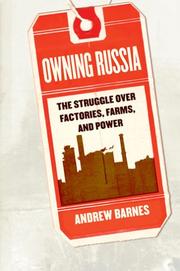| Listing 1 - 10 of 327 | << page >> |
Sort by
|
Book
ISBN: 019184411X 0192529099 Year: 2017 Publisher: Oxford : Oxford University Press,
Abstract | Keywords | Export | Availability | Bookmark
 Loading...
Loading...Choose an application
- Reference Manager
- EndNote
- RefWorks (Direct export to RefWorks)
To understand economics, it is crucial to define wealth, and understand how it is created, destroyed, stored and managed. This edited volume assembles high-quality contributions defining key concepts and addressing economic and policy issues around national wealth.
Book
ISBN: 1003173632 1032003197 1000812332 Year: 2022 Publisher: New York, NY : Routledge,
Abstract | Keywords | Export | Availability | Bookmark
 Loading...
Loading...Choose an application
- Reference Manager
- EndNote
- RefWorks (Direct export to RefWorks)
"Is political equality viable given the unequal private property holdings characteristic of a capitalist economy? This book places the wealth-politics nexus at the centre of scholarly analysis. Traditional theories of democracy and property have often ignored the ways in which the rich attempt to convert their wealth into political power, operating on the implicit assumption that politics is isolated from economic forces. This book brings the moral and political links between wealth and power into clear focus. The chapters are divided into three thematic sections. Part I analyses wealth and politics from the perspective of various political traditions, such as liberalism, republicanism, anarchism, and Marxism. Part II addresses the economic sphere, and looks at the political influence of corporations, philanthropists and commons-based organizations. Finally, Part III turns to the political sphere and looks at the role of political parties and constitutions, and phenomena such as corruption and lobbying. Wealth and Power: Philosophical Perspectives will be of interest to scholars and advanced students working in political philosophy, political science, economics, and law"--
Book
Abstract | Keywords | Export | Availability | Bookmark
 Loading...
Loading...Choose an application
- Reference Manager
- EndNote
- RefWorks (Direct export to RefWorks)
Richesse. --- Wealth. --- wealth. --- France --- France, Statistique, Fortunes. --- Conditions économiques. --- Economic conditions.

ISBN: 0231036590 Year: 1980 Publisher: New York Columbia University Press
Abstract | Keywords | Export | Availability | Bookmark
 Loading...
Loading...Choose an application
- Reference Manager
- EndNote
- RefWorks (Direct export to RefWorks)
Wealth --- -Affluence --- Distribution of wealth --- Fortunes --- Riches --- Business --- Economics --- Finance --- Capital --- Money --- Property --- Well-being --- History --- United States --- Economic conditions --- -Wealth --- History. --- -History --- Affluence --- To 1865

ISBN: 0521776716 0521772125 Year: 2000 Publisher: Cambridge Cambridge university press
Abstract | Keywords | Export | Availability | Bookmark
 Loading...
Loading...Choose an application
- Reference Manager
- EndNote
- RefWorks (Direct export to RefWorks)
Civilization, Ancient. --- Wealth. --- Civilization, Ancient --- Wealth --- Affluence --- Distribution of wealth --- Fortunes --- Riches --- Ancient civilization --- Business --- Economics --- Finance --- Capital --- Money --- Property --- Well-being
Book
ISBN: 9264272232 9264272194 Year: 2017 Publisher: Paris : OCDE,
Abstract | Keywords | Export | Availability | Bookmark
 Loading...
Loading...Choose an application
- Reference Manager
- EndNote
- RefWorks (Direct export to RefWorks)
- Avant-propos - Résumé - Synthèse - Étude spéciale : fiscalité et compétences.
Income tax --- Income. --- Accounting. --- Family income --- Fortunes --- Household income --- Personal income --- Economics --- Finance --- Property --- Wealth --- Gross national product --- Profit --- Purchasing power
Book
ISBN: 9877224968 9873920196 Year: 2016 Publisher: Buenos Aires : CLACSO,
Abstract | Keywords | Export | Availability | Bookmark
 Loading...
Loading...Choose an application
- Reference Manager
- EndNote
- RefWorks (Direct export to RefWorks)
Wealth --- Riqueza --- Development economics --- Economía del desarrollo --- Social aspects. --- Aspectos sociales. --- Economics --- Economic development --- Affluence --- Distribution of wealth --- Fortunes --- Riches --- Business --- Finance --- Capital --- Money --- Property --- Well-being
Book
ISBN: 1282539906 9786612539909 0253004063 9780253004062 0253354072 9780253354075 025322148X 9780253221483 9781282539907 6612539909 Year: 2010 Publisher: Bloomington Indiana University Press
Abstract | Keywords | Export | Availability | Bookmark
 Loading...
Loading...Choose an application
- Reference Manager
- EndNote
- RefWorks (Direct export to RefWorks)
Though the ideas vary greatly, the chapters are organized to facilitate comparisons among these thinkers on issues of ultimate purposes or aspirations of human life; on the penultimate purposes of love, charity, friendship, and care; on the resources available to human beings in this life; and finally on ways to connect and implement in practice our identified resources with our ultimate ends.
Wealth --- Affluence --- Distribution of wealth --- Fortunes --- Riches --- Business --- Economics --- Finance --- Capital --- Money --- Property --- Well-being --- Religious aspects --- Christianity --- History of doctrines. --- Biblical teaching.
Book
ISBN: 9088903085 9789088903083 9789088903076 9088903077 Year: 2015 Publisher: Leiden
Abstract | Keywords | Export | Availability | Bookmark
 Loading...
Loading...Choose an application
- Reference Manager
- EndNote
- RefWorks (Direct export to RefWorks)
"This PhD thesis discusses the practices of wealth depositing in the 1st-9th century AD eastern Baltic (Estonia, Latvia, Lithuania). Wealth deposits are one or more valued object/s that is/are hidden deliberately as an intended separate deposition in a selected place in a specific, distinguishable manner. Wealth depositing is regarded as an important cultural practice which relates to and derives from various past social phenomena and changes respectively in spatial and temporal terms. It is emphasised that wealth deposits should be analysed as a cohesive corpus of material, regardless of specific artefact types, functional groups, production material, environment of concealment, and most importantly without any predetermined interpretation categorisations. The dissertation presents different patterned practices of concealing valuables in the 1st-9th century AD eastern Baltic through a detailed contextual analysis of their main material characteristics: artefacts, their assemblages and appearance, environment of concealment, chronology and location in the cultural landscape. The study demonstrates how depositional practices change in time and space, and analyses relations between specific depositional practices and developments on a wider social scale. A comparative analysis of wealth deposits and important social changes in contemporary society based on overall archaeological material is presented. The key regional and cross-regional practices of wealth depositing in the 1st-9th century AD eastern Baltic are identified. Additionally, further comparisons are drawn between depositional practices in the eastern Baltic and other parts of the Baltic Sea region, especially Scandinavia."--Page 4 of cover.
Wealth --- Affluence --- Distribution of wealth --- Fortunes --- Riches --- Business --- Economics --- Finance --- Capital --- Money --- Property --- Well-being --- History --- Baltic States --- Baltic Republics --- Baltics (States) --- History. --- Antiquities. --- To 1500

ISBN: 1501726757 9781501726750 0801444349 9780801444340 Year: 2018 Publisher: Ithaca, NY
Abstract | Keywords | Export | Availability | Bookmark
 Loading...
Loading...Choose an application
- Reference Manager
- EndNote
- RefWorks (Direct export to RefWorks)
During and after the breakdown of the Soviet Union, a wide range of competitors fought to build new political and economic empires by wresting control over resources from the state and from each other. In the only book to examine the evolution of Russian property ownership in both industry and agriculture, Andrew Barnes uses interviews, archival research, and firsthand observation to document how a new generation of capitalists gained control over key pieces of the Russian economy by acquiring debt-ridden factories and farms once owned by the state. He argues that although the Russian government made policies that affected how actors battled one another, it could never rein in the most destructive aspects of the struggle for property.Barnes shows that dividing the spoils of the Soviet economy involved far more than the experiment with voucher privatization or the scandalous behavior of a few Moscow-based "oligarchs." In Russia, the control of property yielded benefits beyond mere profits, and these high stakes fueled an intense, enduring, and profound conflict over real assets. This fierce competition empowered the Russian executive branch at the expense of the legislature, dramatically strengthened managers in relation to workers, created a broad array of business conglomerates, and fundamentally shaped regional politics, not only blurring the line between government and business but often erasing it.
Real property --- Wealth --- Privatization --- Property --- Affluence --- Distribution of wealth --- Fortunes --- Riches --- Business --- Economics --- Finance --- Capital --- Money --- Well-being --- Russia (Federation) --- Economic conditions
| Listing 1 - 10 of 327 | << page >> |
Sort by
|

 Search
Search Feedback
Feedback About UniCat
About UniCat  Help
Help News
News